On the eve of a new season of The Tommy Tiernan Show, its host wonders at its success and talks of what has shaped him personally and professionally. Donal O'Donoghue 'meets’ him in the henhouse.
"I really have no idea why people like the show so much," says Tommy Tiernan of his acclaimed TV chat show.
Now in its eighth season, The Tommy Tiernan Show is a primetime vehicle unlike any other: the guests are not revealed to the host until they walk out, the script is unwritten and the conversation can go anywhere.
"No other country wants to do this chat-show," says the comedian, actor and writer, who came up with the novel idea which was pitched as a global franchise, but with no takers so far. The show’s uniqueness owes a lot to the host who boldly goes, following a map-less path.
"One of my friends said to me recently that what he loves about the chat show is that it’s one of the few shows on primetime television where things are allowed to get awkward," says Tiernan, laughing.
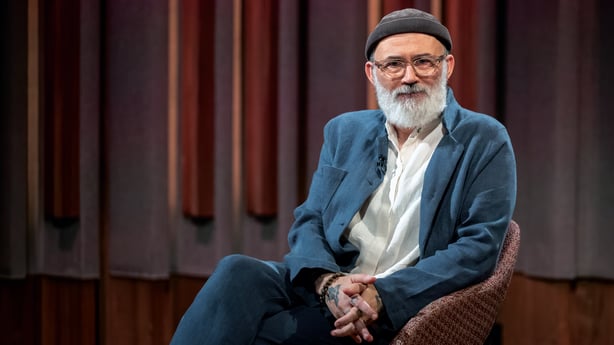
Tommy is in his shed, beanie on his head, tattooed hand on chin. He’s sporting a big white beard of Santa dimensions and the backdrop is a shelf of books.
"I’m always in here," he says of what he calls the ‘henhouse’ that is also home to the popular podcast, Tommy, Hector and Laurita. Like his TV show, that three-headed beast is an uncharted adventure: Tiernan a keen thinker, talker and listener. These attributes also define the TV show, where his innate curiosity about his interviewees suggests a man who has often questioned himself.
And yet, when I ask him what he might have learned about himself through quizzing others, he pauses, repeats the line, and says finally: "I don’t think that I’ve learned anything about myself. Is there going to be a test?"
There have been moments when the tables were turned, most memorably when the actor Gabriel Byrne, having been asked if he considered himself strange, put the same question to the chat-show host. "I am a strange person," replied Tiernan. "I'd be difficult to live with, but I’d be ultimately harmless."
Harmless? I doubt that, I say. Tommy laughs. "You have no value to the culture if you are harmless," he agrees. "You might be a wonderful human being and a great neighbour but being harmless is not what culture thrives on. Last year, we lost Christy, Sinéad and Shane and part of what we valued about them was their untameability. They didn’t run with the herd; they weren’t harmless. With me, my wiring is such that I’m a bit unsettled, and that’s something that I’m not entirely in control of."
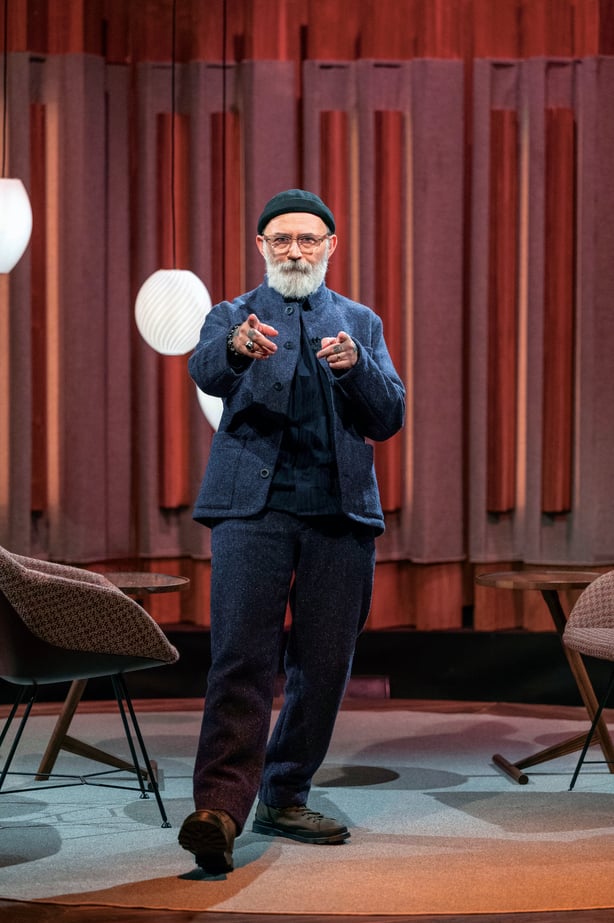
Tommy Tiernan lives in Bearna, Co Galway, with his wife Yvonne and their family (he has three children from a previous relationship with Jayme Street and three children with Yvonne).
"How is it going?" he repeats slowly when asked about the show. "I suppose as long as it keeps refreshing itself or surprising people, then it’s worth continuing. So how do you measure that?" I imagine that’s as much to do with the show also continuing to surprise him. "Yes, that’s what I’m saying, as long as I’m being surprised. And that’s a challenge for the researchers."
He likens the show to the improvisational jazz of Keith Jarrett, a musician who steps out onto the stage not entirely knowing the way ahead. It's also akin to this interview: not so much a test as a quest, like pulling a thread to see where it might take you or what might unravel.
Earlier this year, I met Tommy’s sister Anne (he has two other siblings, Niamh and Brian), who had just published her debut novel, The Last of Joy. That fiction was in one way a take on her complicated relationship with their mother, Helen, who took her own life in 2011.
Anne said writing the book had helped her confront her past and make peace with it. Has Tommy made peace with his past?
"I think that the nature of ghosts changes, so something that bothered you for years might suddenly, for reasons you’re not sure of, fade away. But memory is so treacherous. My father used to say this thing of ‘When I can’t sleep, I try to remember something that I’ve never remembered before’. I have found myself recently remembering things that I’ve never remembered before and some of them are very traumatic and difficult to live with.
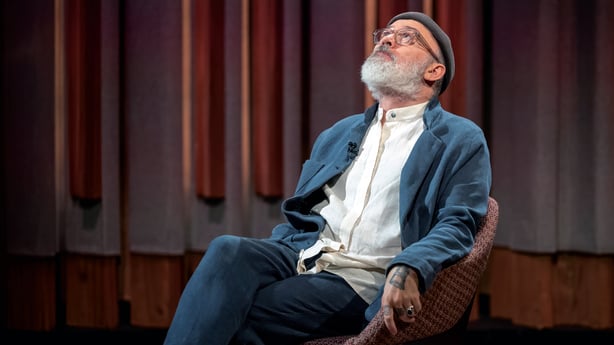
He is wary of using his past to frame his present. "There’s a stampede towards confession these days," he says with a laugh. Is that a good or bad thing? "It’s either interesting or it isn’t, and I believe that it is on the verge of getting boring. Podcasts are probably the place for those kinds of conversations. And in a way that’s what we are trying to do with the chat show; that’s what the format allows.
"If I was hosting The Late Late Show with someone in my ear and with a list of questions, that’s like being in a musical where you must hit certain beats. In our show there’s nothing like that. It allows strangeness. The format is available to buy, and I thought once, if other countries were to buy it, that it would be great. But no other country wants to do this chat-show. Seemingly, they can’t find people willing to take the risk."
The show seems to be a perfect fit for Tiernan. "I’m inclined to put myself under pressure," he says.
"It’s like years ago when I did those fully improvised stand-up shows. I enjoy the adrenaline rush, back against the wall, that feeling of being under pressure. I was the same as a kid with homework. I never did my homework the night before. In the morning, I’d go into the school at a quarter to nine and do my homework for the first class. Then during that first class, when the geography teacher wasn’t looking, I’d be copying my French homework from the fellow beside me. Then during French I’d be doing maths and so on. That feeling of pressure probably comes from the fact that our house growing up was lively, so we got used to living in a pressurised situation."
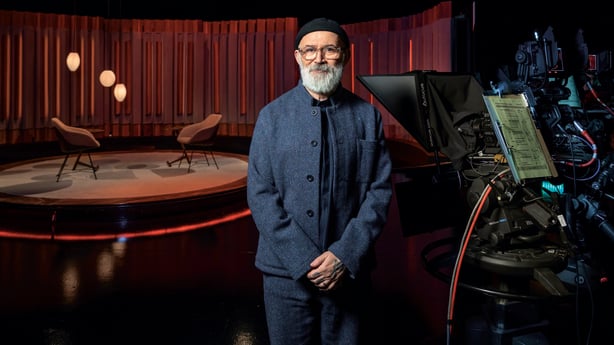
I wonder if that need to put himself under pressure is shaped by the ghosts of his past. "I sense that you are eager for me to talk about my Mam" he says.
"What I will say in terms of my Mam is that it is an ongoing fog and the nature of my relationship to my mother and the fact that she is dead means that the fog will never clear. I will never be able to have clarity and certitude when it comes to my relationship with her. Never. There are no more discussions to be had, no more clambering towards some sort of reconciliation or understanding. All you can do is learn to live with the fog and realise that’s just the nature of it. I will never know really who my mother was or what she was like. That’s it really. I can’t say any more. I can talk about it but how do you describe a fog?"
When we spoke in early December, Tiernan had recorded five of this season’s 16 episodes. "The decision we made this year was to film without an audience," he says. "Last year, we had a few comedians – and I’d be the same – your ear would be half-cocked for the laugh, and you play to that. The audience are also affected by the fact that they are in RTÉ. For that reason, The Late Late Show was one of the toughest places in the world to do stand-up. It was like getting up at a First Holy Communion and trying to do jokes." Not that that is ever likely to stop him.
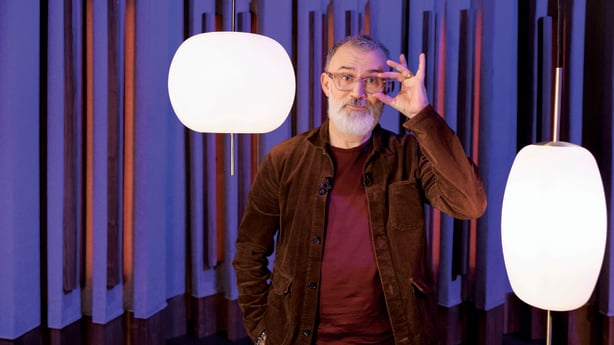
Next year, Tommy Tiernan is back on tour in the US, as well as the UK and Ireland. "I’m a comedian of a particular generation – I’m 54 – and as such, I can’t fully appreciate what people in their teens and their 20s are going through," he says. "But to me, it seems strange if someone says that they don’t feel safe at a stand-up show because the comedian talked about a certain subject and people started laughing. There are so many conflicting make-ups in the culture that there is bound to be dissonance and tension. But I believe you just must plough on."
And he does: fierce, sometimes flawed, ever unsettled, but always pushing himself and the boundaries of the possible.


